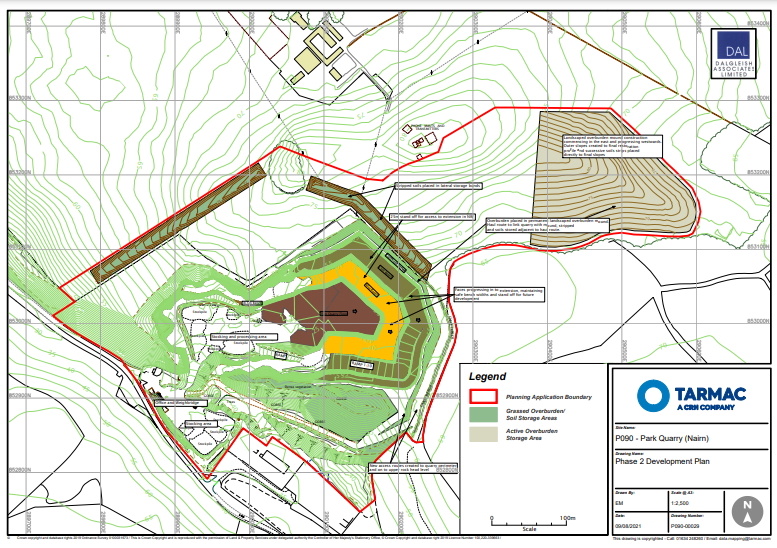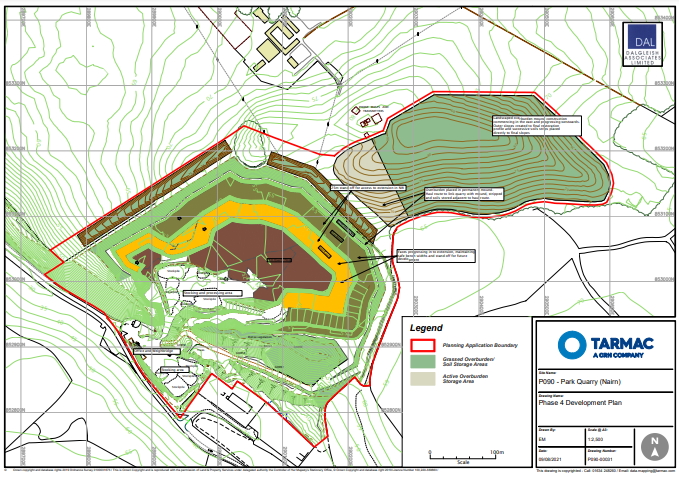Proposals
Park Quarry
Rationale

An extension to Park Quarry would maintain a long-term, sustainable source of local construction materials from an established source. Rock products are essential in almost every construction project, but they are bulky and heavy to transport. Maintaining a local quarry helps minimise transport distances, energy use and - in turn - the carbon footprint.
The development would also enable the site to continue providing a distinctive local product for construction and decorative use, as well as larger infrastructure projects, such as the Inverness to Nairn section A96 dualling.
Extending the working life of Park would also contribute to the general economy, including local jobs and supporting work for local businesses, hauliers, and supply chain partners.
Overview
Our proposed design would see the quarry widened into the north-west and south-east of the current quarry.
The extended distance of the final face would be approximately 100 metres (110 yards) in both directions and the new area of extraction would be approximate 3 hectares (7.5 acres).
This expansion would sustain the quarry at its current rate of extraction for 20 to 30 years, depending on output, with a further year required for restoration works.
The granite at Park Quarry is overlain by clay and weathered stone, which needs to be removed so that the rock underneath can be excavated. Since Park Quarry has a small footprint, this material needs to be stored elsewhere. Our design distributes it on land to the north of the site, where it would be landscaped sympathetically to blend in with the surrounding agricultural land. The original topsoil will be carefully set aside so that it can be used on top of this landscaped area to help it return quickly to agricultural use.
Everything about how we work the quarry now would stay the same as we enter the new development area: the same number of vehicles, the same extraction methods, the same rate of production and extraction, and the same number of staff. The quarry would also retain the existing site infrastructure, access routes, plant and machinery, so there would be no additional impact from new or larger equipment.
Hours of operation would remain as current, with the site working:
- 6.00am to 7.00am for loading and despatch, Monday to Saturday
- 7.00am to 7.00pm Monday to Friday and 7.00am to 1.00pm Saturdays for all operations
- No Sunday working, except for essential maintenance
Phases
If approved, the proposed expansion of Park would take place gradually in five phases over 20 to 30 years (likely beginning in 2023), with a final restoration phase of one year at the end. This can be seen in this fly-through video of the restoration plans and phases. These periods are based on current forecasts, which dictate extraction rates, so these timings could differ.
Phase 1
Phase 1 is essentially the currently permitted scheme, with the existing quarry faces being developed to the north-east in levels or “benches” at 25, 40 and 55m Above Ordnance Datum (AOD).
Phase 2

Timescales
Should the application be successful, we would expect to begin work on the new development by 2023, with work ongoing in phases until 2043 and restoration completed by 2045. This is based on estimated output levels. If these vary or are lower, the timeline could extend, but this is unlikely to be beyond 30 years.




